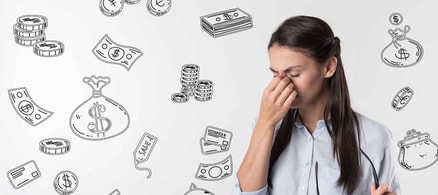Consumer debt is on the rise
Total household debt in the U.S. rose by 1.3% to reach $17.29 trillion in the third quarter of 2023, according to the latest numbers from the Federal Reserve Bank of New York. (That 1.3% is equivalent to a whopping $228 billion.)
In general, Americans have four main types of debt — housing, auto, student loan and credit card — and all grew in Q3 2023. Mortgage balances and balances on home equity lines of credit (HELOC) were $12.49 trillion. Meanwhile, non-housing debt was a total of $4.8 trillion.
How to get a free $20 to invest in your future
An app called Acorns automatically rounds up purchases made on your credit or debit card to the nearest dollar and places the excess "change" into a smart investment portfolio. Acorns offers a $20 welcome bonus, immediately from your first investment.
Get $20Why is consumer debt rising?
Many Americans are burning through the money they squirreled away during the COVID-19 pandemic, according to JPMorgan research reported on by Business Insider. Combine that with persistent inflation and soaring interest rates, and there’s worry that we could (still) be in for a recession.
Credit card balances, which saw a 4.7% increase in Q3 to $1.08 trillion, actually declined during the pandemic. A report from the U.S. Government Accountability Office (GAO) found that “many people likely used their pandemic stimulus payments to pay down their credit card balances.”
Low interest rates also helped to improve household cash flow, with about 14 million households refinancing their mortgages in 2021. Those with student debt also benefited from a temporary pause on federal student loans.
“The period of very low interest rates that supported many of these developments is decidedly over, at least for now, suggesting that household finances will likely tighten further in the coming months,” according to October 2023 analysis from New York Fed economists. And there’s “tremendous uncertainty” about how much is left of household excess savings.
Credit card delinquencies — which saw historic lows during the pandemic — surpassed pre-pandemic levels in Q3 2023. Nearly 50% of credit cardholders are carrying a balance from one month to the next as of November, according to a recent survey, up from 31% in 2021 and 47% in July of last year.
And the resumption of student loan payments in October after a more than three-year pause could “have substantial negative effects on vulnerable households,” said the New York Fed economists.
Are we in for a recession?
Three in four economists believe the chance of a recession in the next 12 months is 50% or less, according to a December 2023 survey from the National Association for Business Economics (NABE). They also anticipate a slowing in inflation (though, unfortunately, not with food or energy costs), while 80% expect interest rate cuts to begin this year — likely in the second or third quarter.
But it’s those who are most vulnerable that are likely to pay the price.
“Overextended consumers have the least cushion to soften the blows from rising interest rates and weather the corrosive effect of inflation on income and affordability, as well as other economic headwinds,” according to analysis from S&P Global.
The average American probably doesn’t have the same extravagant expenses as Kanye West, who proposed to Kim Kardashian in 2013 by renting out AT&T Park in San Francisco — complete with a live performance by the Chicago Symphony Orchestra.
But, in uncertain economic times, it’s a good idea to cut back on unnecessary spending, double-down on paying debts and make sure you have enough emergency savings.
Sponsored
Follow These Steps if you Want to Retire Early
Secure your financial future with a tailored plan to maximize investments, navigate taxes, and retire comfortably.
Zoe Financial is an online platform that can match you with a network of vetted fiduciary advisors who are evaluated based on their credentials, education, experience, and pricing. The best part? - there is no fee to find an advisor.






